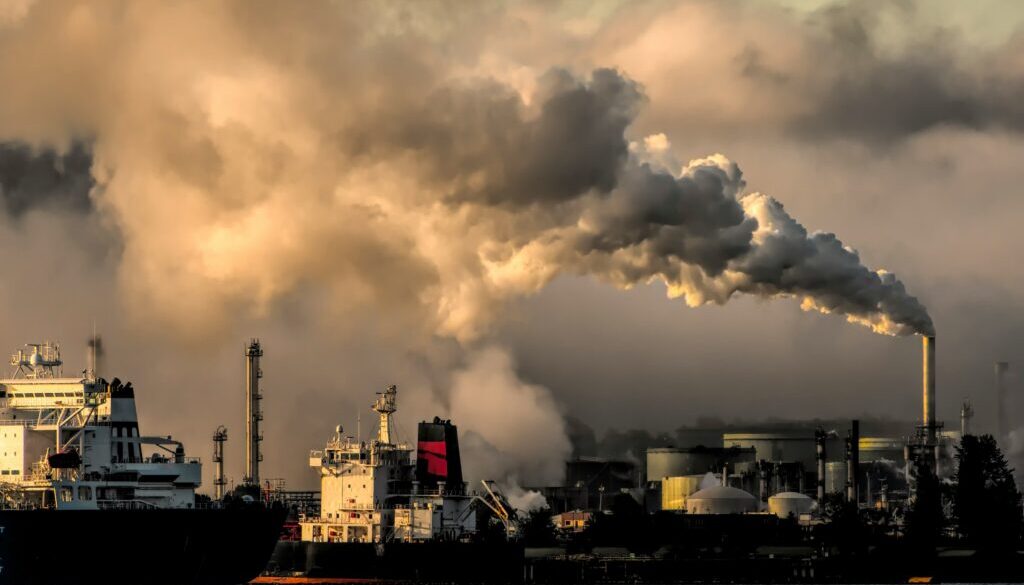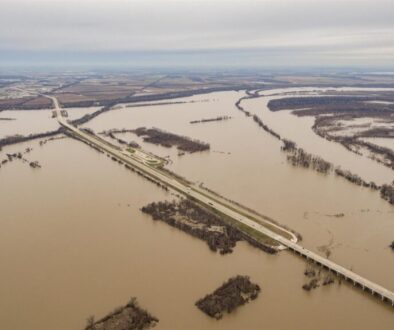Legal battle over fossil fuels and climate heats up
By Dana Drugmand
As climate change fuels increasingly damaging extreme weather events across the United States, litigation is growing against fossil fuel companies accused of being to blame for the devastation. But a series of recent legal moves by the industry and mixed judicial decisions underscore the challenges that local and state government plaintiffs face in the multi-billion-dollar battle.
Just last month, the industry scored a significant win when a Maryland circuit court judge tossed out a six-year-old climate liability case against more than two dozen of the world’s largest fossil fuel companies. The case, filed in 2018 by Baltimore officials, accused the companies of hiding the climate-harming impacts of their products, causing rising sea levels, severe storms, flooding, heatwaves and other “dire effects on the world.”
The fossil fuel companies successfully argued, however, that because the legal claims center on global greenhouse gas emissions, they stretch beyond the bounds of state laws. Greenhouse gas emissions from fossil fuels are regulated by the US Environmental Protection Agency (EPA), and federal law – particularly the Clean Air Act – preempts state law claims pertaining to those emissions, according to the industry.
“Regulation of interstate and international greenhouse gas emissions is beyond the role of state law,” Phil Goldberg, special counsel for an industry initiative working to combat climate litigation, said in a statement.
In June, a judge in Colorado ruled the opposite in a separate case also brought in 2018, finding that federal law does not preempt claims brought by the city and county officials in Boulder, Colorado, against ExxonMobil and three Suncor entities.
“Enormous” stakes
Other courts have similarly shot down the preemption argument. In response, the fossil fuel industry and its allies have asked the US Supreme Court to take up their preemption argument in a case brought by the city of Honolulu in hopes a favorable ruling in that case would shield them from the potential for billions of dollars in damage awards.
“The stakes in this case could not be higher,” oil company lawyers stated in their petition to the Supreme Court. The cases that have been filed “present a serious threat” to the oil and gas industry, according to the petition.
In June, the high court invited the US Department of Justice’s Solicitor General to submit a brief on the matter as they weigh whether or not to hear the Honolulu case.
In alignment with the industry, Alabama Attorney General Steve Marshall led a 19-state coalition that filed a request with the US Supreme Court in May seeking to sue California and four other states that have brought climate liability lawsuits against the fossil fuel industry. That request is pending.
“If Defendant States are right about the substance and reach of state law, their actions imperil access to affordable energy everywhere and inculpate every State and indeed every person on the planet,” the coalition petition states. “Consequently, Defendant States threaten not only our system of federalism and equal sovereignty among States, but our basic way of life.”
In April, Alabama additionally led a multi-state amicus brief to the Supreme Court siding with the energy companies in asking the court to review the Honolulu case.
The court’s decisions on the issue could have significant ramifications for the more than two dozen climate accountability cases currently pending.
“The cost of climate damage is enormous, and so the stakes are truly enormous,” said David Bookbinder, a lawyer with the Environmental Integrity Project who is helping provide legal representation to government plaintiffs in Colorado.
So far, California and seven other states have brought suits, as have dozens of municipalities, two tribal governments and the District of Columbia, according to the Center for Climate Integrity. Many of the cases have been bogged down by industry challenges over whether or not they should proceed in state or federal courts.
Targeted defendants include ExxonMobil, Chevron, Shell BP PLC and other global oil and gas players. The lawsuits allege the companies knew decades ago about the potential for their products to cause “catastrophic” climate-related harms, yet publicly downplayed or denied the risks in order to stave off effective climate policies and protect profits.
Exxon, Chevron, and Shell did not respond to requests for comment. BP declined to comment on the pending litigation.
Conspiracy alleged
The June 21 Boulder ruling delved deeply into the arguments from both sides that are representative of the tooth-and-nail fight being waged in numerous states.
In one key allegation, Boulder officials allege a conspiracy between the energy companies “to promote and sustain unchecked fossil fuel sales at levels they knew were sufficient to alter the climate,” and allege the companies failed to disclose material information “concerning the activities to maintain and increase their profits.”
The oil companies in that case argue that they did not engage in any “unlawful act”, and that allowing the case to go forward threatens “to upset bedrock federal-state divisions of responsibility” and could have “profound implications for the global economy, international relations, and America’s national security.”
The avalanche of litigation brought in various states threatens Congress’s objective of increasing fossil fuel extraction, they assert.
But the judge in that case, citing “a host of other courts” that have come to a similar conclusion, said the industry’s arguments fail as the local governments were not seeking to regulate emissions but rather to recover damages for the industry’s actions.
The Hawaii Supreme Court is among those courts that have also rejected oil companies’ federal preemption argument, noting in its decision that a lawsuit brought by Honolulu does “not seek to regulate emissions.”
Many of the cases aim to recover damage costs associated with responding and adapting to climate impacts while some of the suits specifically seek to put a stop to what they argue is deceptive public communications from fossil fuel companies.
Puerto Rico officials said last month that they were taking legal action to compel leading fossil fuel companies to contribute to a billion-dollar fund that could be tapped to strengthen public infrastructure against sea level rise and storm damage, and finance local climate resilience measures such as the reconstruction of natural barriers to protect communities from sea level rise.
That lawsuit follows a sweeping class action climate fraud suit filed by Puerto Rican municipalities against fossil fuel companies in 2022 and a nearly identical case filed by San Juan in December.
Other recent actions include a lawsuit filed in February by Chicago officials against six major oil and gas companies and their chief trade association, the American Petroleum Institute. A similar case was filed in March against the same defendants by officials in Bucks County, Pennsylvania. More lawsuits are expected; Michigan, for example, has one in the works.
Legal observers say it is too soon to tell if any of the cases will ever go to trial, but at least one – filed by the Massachusetts attorney general against ExxonMobil – is progressing through pre-trial discovery now.
“I do think [these cases] will move forward,” said Katrina Fischer-Kuh, an environmental law professor at Pace University School of Law.
Industry documents as evidence
Over the last several years, a wealth of evidence has already been uncovered showing the industry has long had knowledge of the climate-altering impacts of its products.
Industry documents have revealed that as early as 1954, the fossil fuel and automotive industries were funding climate research and were made aware that rising atmospheric CO2 concentrations could “ultimately prove of considerable significance to civilization.”
In 1959, prominent physicist Edward Teller warned oil industry executives in a symposium speech about the prospect of melting ice caps and sea level rise. “It has been calculated that a temperature rise corresponding to a 10 percent increase in carbon dioxide will be sufficient to melt the icecap and submerge New York,” Teller said. “All the coastal cities would be covered, and since a considerable percentage of the human race lives in coastal regions, I think that this chemical contamination is more serious than most people tend to believe.”
In 1965 at the annual meeting of the American Petroleum Institute (API), then-API president Frank Ikard summarized the main findings of an environmental report from President Lyndon Johnson’s scientific advisers. He said the report found that fossil fuel combustion was adding carbon dioxide to the atmosphere at such a rate that by 2000, it could cause “marked changes in climate beyond local or even national efforts,” adding that “time is running out” to save the world’s peoples from “catastrophic consequences” of fossil fuel pollution.
By the 1970s, Exxon and other major oil and gas companies were conducting research on the effects of fossil fuel usage on the climate system, and were internally acknowledging the potential consequences. In 1979, an internal Exxon memo summarized findings of a report studying the potential impacts of fossil fuel combustion on CO2 concentrations. The memo acknowledged that “CO2 buildup in the atmosphere is a worldwide problem” and that limiting fossil fuel use would be necessary to prevent “significant climatic changes.”
In the 1980s, oil companies internally expressed additional worries. A 1981 internal Exxon memo noted the possible emission consequences of fossil fuel use, and warned of possible “catastrophic” effects.
In 1988, Shell issued a confidential report that warned that unchecked warming “could create significant changes in sea level, ocean currents, precipitation patterns, regional temperature and weather. These changes could be larger than any that have occurred over the last 12,000 years. Such relatively fast and dramatic changes would impact on the human environment, future living standards and food supplies, and could have major social, economic, and political consequences.”
Despite the internal concerns, in the late 1980s the industry started to organize strategic coalitions and campaigns to publicly sow doubt about climate science and deny the severity of climate change.
The Global Climate Coalition – an industry lobby group representing entities in the fossil fuel, chemical, auto and other carbon-intensive sectors – formed in 1989, opposing regulatory and policy actions on climate throughout the 1990s.
“Big Oil knew that their product would cause immense damage. They lied to the public about it, and then spent billions of dollars to lobby and spread disinformation to try to block climate action,” said Jamie Henn, a climate activist and founder and executive director of Fossil Free Media. “These lawsuits are one of the most powerful tools we have to hold the industry accountable.”
Photo by Chris LeBoutillier on Unsplash
 EWG
EWG


